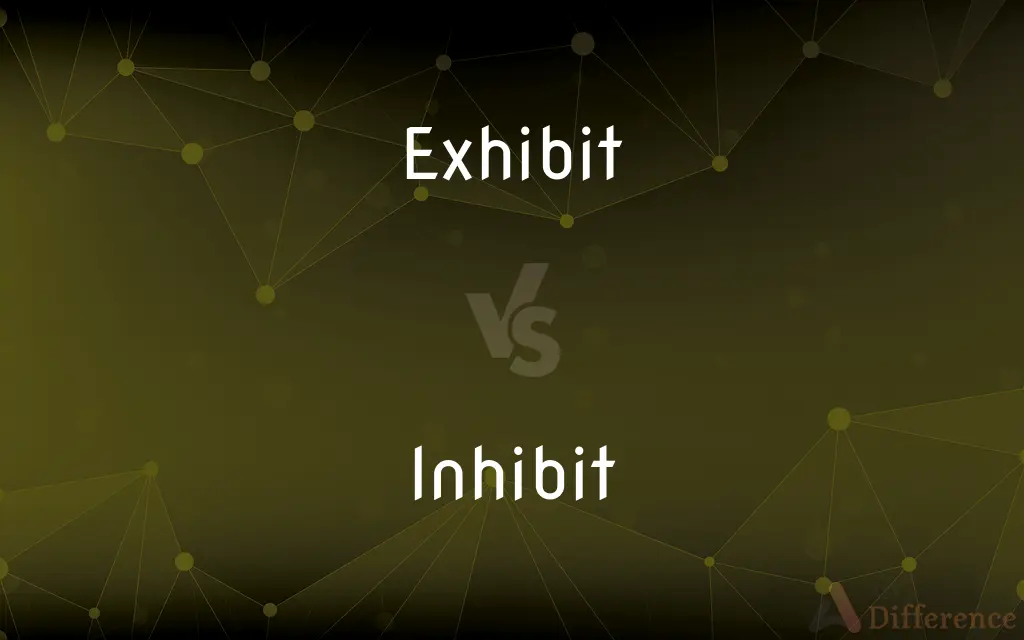Exhibit vs. Inhibit — What's the Difference?
By Maham Liaqat & Urooj Arif — Updated on April 6, 2024
Exhibit means to show or display something, while inhibit refers to restraining or holding back actions or processes.

Difference Between Exhibit and Inhibit
Table of Contents
ADVERTISEMENT
Key Differences
Exhibit is primarily used to describe the act of showing, displaying, or presenting something, whether it be in a museum, gallery, or any context where information or items are made visible to an audience. In contrast, inhibit pertains to the action of hindering, limiting, or restraining certain actions, processes, or behaviors, often implying a reduction in the effectiveness or occurrence of something.
While exhibiting involves making something more apparent or understood, inhibiting suggests a reduction or suppression of an activity or process. For instance, an artist exhibits their work to the public, aiming to share and communicate their artistic expressions. Conversely, certain chemicals may inhibit the growth of bacteria, thereby preventing their proliferation. This fundamental difference highlights the opposing nature of these verbs in terms of promoting visibility versus restricting actions or effects.
The context in which these terms are applied also marks a significant distinction. Exhibit is often used in educational, cultural, or artistic settings, where the goal is to share knowledge or creativity with others. Inhibition, however, is a term frequently encountered in scientific, psychological, or technical discussions, where controlling or limiting certain reactions or behaviors is essential. For example, a museum exhibit aims to educate and enlighten visitors, whereas a drug may inhibit the spread of a virus within the body.
Additionally, the outcomes associated with each term differ markedly. Exhibiting something typically results in increased awareness, appreciation, or understanding among an audience. Inhibition, on the other hand, results in decreased activity, growth, or expression, often serving a protective or regulatory purpose in biological and mechanical systems.
Lastly, the way these terms interact with their subjects and objects also contrasts. When something is exhibited, it is often passive, being shown by someone or something else. Inhibition, however, implies an active restriction or limitation imposed on a process or behavior, often requiring an agent that causes the inhibition. This difference underscores the active versus passive roles associated with exhibiting and inhibiting, respectively.
ADVERTISEMENT
Comparison Chart
Definition
To show or display openly.
To hinder or restrict an action or process.
Context
Often used in cultural, educational, or artistic settings.
Commonly found in scientific, medical, or technical discussions.
Outcome
Leads to increased awareness or appreciation.
Results in decreased activity or suppression.
Nature
Involves making something visible or known.
Involves limiting or preventing certain actions.
Examples
Art exhibitions, museum displays.
Inhibiting enzymes, restricting behaviors.
Compare with Definitions
Exhibit
To display or present works of art or items of interest.
The gallery exhibits contemporary paintings.
Inhibit
To prevent or hold back an action or process.
The drug inhibits viral replication.
Exhibit
Making something clear or evident.
The student exhibited exceptional talent during the competition.
Inhibit
Restricting the function or activity of.
The enzyme is inhibited by the chemical.
Exhibit
To reveal or manifest a trait or characteristic.
The plant exhibits rapid growth in spring.
Inhibit
To discourage or suppress a response.
The teacher's strictness inhibits classroom discussion.
Exhibit
Public showing or demonstration.
The museum exhibits artifacts from ancient civilizations.
Inhibit
Limiting growth or development.
Lack of sunlight inhibits plant growth.
Exhibit
To produce or show signs of.
The patient exhibited symptoms of the illness.
Inhibit
To restrain or reduce the occurrence of something.
The regulations inhibit harmful emissions.
Exhibit
To show outwardly; display
Exhibited pleasure by smiling.
Inhibit
To hold back; restrain
Barricades that inhibited the movement of the crowd.
A lack of knowledge that inhibited his inclination to ask questions.
Exhibit
To present for others to see
Rolled up his sleeve to exhibit the scar.
Inhibit
To cause (a person) to behave in a restrained or self-conscious way
He felt inhibited by the presence of so many famous people.
Exhibit
To present in a public exhibition or contest
Exhibited her paintings at a gallery.
Inhibit
(Psychology) To suppress or restrain (behavior, an impulse, or a desire) consciously or unconsciously.
Exhibit
To give evidence or an instance of; demonstrate
Young musicians eager to exhibit their talent.
A plant that exhibits dimorphism.
Inhibit
(Chemistry) To prevent or decrease the rate of (a reaction).
Exhibit
To put something on public display.
Inhibit
(Biology) To decrease, limit, or block the action or function of (an enzyme or organ, for example).
Exhibit
A public showing; an exhibition
Spent the afternoon at the art exhibit.
Inhibit
To prohibit (an ecclesiastic) from performing clerical duties.
Exhibit
Something exhibited
Each exhibit in the show took hours to assemble.
Inhibit
(transitive) To hold in or hold back; to keep in check; restrain.
Inhibit someone's freedom
Inhibit someone's education
Exhibit
(Law) Something marked for identification with the purpose of being introduced as evidence
Referred to Exhibit A.
Inhibit
(Philippines) To recuse.
Exhibit
(Informal) Something used as an example, as when arguing or making a point
You never do your chores—Exhibit A.
Inhibit
To check; to hold back; to restrain; to hinder.
Their motions also are excited or inhibited . . . by the objects without them.
Exhibit
(transitive) To display or show (something) for others to see, especially at an exhibition or contest.
He wanted to exhibit his baseball cards.
Inhibit
To forbid; to prohibit; to interdict.
All men were inhibited, by proclamation, at the dissolution, so much as to mention a Parliament.
Burial may not be inhibited or denied to any one.
Exhibit
(transitive) To demonstrate.
The players exhibited great skill.
Inhibit
To cause the rate of (a chemical or biochemical reaction) to proceed slower, or to halt; as, vitamin C inhibits oxidation; penicillins inhibit bacterial cell wall synthesis.
Exhibit
To submit (a physical object) to a court as evidence.
I now exhibit this bloody hammer.
Inhibit
To restrain (a behavior) by a mechanism involving conscious or unconscious motivations.
Exhibit
(intransitive) To put on a public display.
Will you be exhibiting this year?
Inhibit
To put down by force or authority;
Suppress a nascent uprising
Stamp down on littering
Conquer one's desires
Exhibit
(medicine) To administer as a remedy.
To exhibit calomel
Inhibit
Limit the range or extent of;
Contact between the young was inhibited by strict social customs
Exhibit
An instance of exhibiting.
Exhibit
That which is exhibited.
Exhibit
A public showing; an exhibition.
The museum's new exhibit is drawing quite a crowd.
Exhibit
(legal) An article formally introduced as evidence in a court.
Exhibit A is this photograph of the corpse.
Exhibit
To hold forth or present to view; to produce publicly, for inspection; to show, especially in order to attract notice to what is interesting; to display; as, to exhibit commodities in a warehouse, a picture in a gallery.
Exhibiting a miserable example of the weakness of mind and body.
Exhibit
To submit, as a document, to a court or officer, in course of proceedings; also, to present or offer officially or in legal form; to bring, as a charge.
He suffered his attorney-general to exhibit a charge of high treason against the earl.
Exhibit
To administer as a remedy; as, to exhibit calomel.
Exhibit
Any article, or collection of articles, displayed to view, as in an industrial exhibition; a display; as, this exhibit was marked A; the English exhibit.
Exhibit
A document produced and identified in court for future use as evidence.
Exhibit
An object or statement produced before a court of law and referred to while giving evidence
Exhibit
Something shown to the public;
The museum had many exhibits of oriental art
Exhibit
Show an attribute, property, knowledge, or skill;
He exhibits a great talent
Exhibit
To show, make visible or apparent;
The Metropolitan Museum is exhibiting Goya's works this month
Why don't you show your nice legs and wear shorter skirts?
National leaders will have to display the highest skills of statesmanship
Exhibit
Show or demonstrate something to an interested audience;
She shows her dogs frequently
We will demo the new software in Washington
Exhibit
Walk ostentatiously;
She parades her new husband around town
Common Curiosities
What is the difference between an exhibit and an exhibition?
An exhibit refers to a single display or item shown, while an exhibition is a larger event or collection of items being displayed.
Can a person exhibit inhibitory behavior?
Yes, a person can exhibit inhibitory behavior by restraining or controlling their impulses or actions in social or personal contexts.
How do inhibitors function in chemical reactions?
Inhibitors function by binding to reactants or catalysts, slowing down or preventing chemical reactions from occurring.
Is it possible for one action to exhibit and inhibit simultaneously?
While the actions are opposite, certain contexts may allow for something to be both exhibited and inhibited in different aspects, such as exhibiting caution while inhibiting rash actions.
What does it mean to exhibit something?
To exhibit means to show, display, or present something publicly or make it visible for others to see.
How does inhibition work in a biological context?
In biology, inhibition often refers to the process of limiting or controlling a biological activity, such as enzyme actions or cellular processes.
How do exhibitions contribute to education?
Exhibitions contribute to education by providing visual and interactive experiences that enhance understanding and learning.
Can inhibitory signals be beneficial?
Yes, inhibitory signals can be beneficial in regulating bodily functions and preventing overactivity or damage within biological systems.
What challenges do curators face when creating exhibits?
Curators face challenges such as selecting relevant items, designing engaging displays, and interpreting objects in ways that resonate with the public.
Can environmental factors exhibit or inhibit growth?
Environmental factors can both exhibit effects on growth by enabling conditions for it, and inhibit growth by imposing limitations or adverse conditions.
What role do inhibitors play in medicine?
In medicine, inhibitors play a crucial role in treating diseases by blocking specific enzymes or receptors involved in disease processes.
What are common inhibitors in everyday products?
Common inhibitors include preservatives in food, antioxidants in cosmetics, and corrosion inhibitors in metals.
Can inhibiting one process lead to the exhibition of another?
Yes, inhibiting one biological or chemical process can sometimes trigger or enhance the visibility of another, due to interconnected pathways.
How do educational programs exhibit learning outcomes?
Educational programs exhibit learning outcomes through assessments, demonstrations, and practical applications of knowledge.
How do museums decide what to exhibit?
Museums decide based on the significance, educational value, and interest of items, as well as thematic relevance to current exhibitions.
Share Your Discovery

Previous Comparison
Millet vs. Couscous
Next Comparison
Magic vs. MagicalAuthor Spotlight
Written by
Maham LiaqatCo-written by
Urooj ArifUrooj is a skilled content writer at Ask Difference, known for her exceptional ability to simplify complex topics into engaging and informative content. With a passion for research and a flair for clear, concise writing, she consistently delivers articles that resonate with our diverse audience.
















































